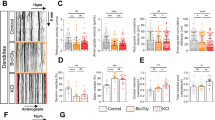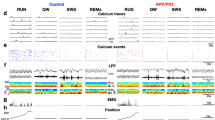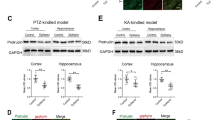Abstract
NEURONAL degeneration in the hippocampus, a region of the brain important for acquisition of memory in humans, occurs in various pathological conditions, including Alzheimer's disease, brain ischaemia and epilepsy. When neuronal activity is stimulated in the adult rat and mouse hippocampus, tissue plasminogen activator (tPA), a serine protease that converts inactive plasminogen to the active protease plasmin, is transcriptionally induced1,2. The activity of tPA in neural tissue is correlated with neurite outgrowth3, regeneration4 and migration5, suggesting that it might be involved in neuronal plasticity. Here we show that tPA is produced primarily by microglia in the hippocampus. Using excitotoxins to induce neuronal cell loss, we demonstrate that tPA-deficient mice are resistant to neuronal degeneration. These mice are also less susceptible to pharmacologically induced seizures than wild-type mice. These findings identify a role for tPA in neuronal degeneration and seizure.
This is a preview of subscription content, access via your institution
Access options
Subscribe to this journal
Receive 51 print issues and online access
$199.00 per year
only $3.90 per issue
Buy this article
- Purchase on Springer Link
- Instant access to full article PDF
Prices may be subject to local taxes which are calculated during checkout
Similar content being viewed by others
References
Qian, Z., Gilbert, M., Colicos, M., Kandel, E. & Kuhl, D. Nature 361, 453–457 (1993).
Carroll, P., Tsirka, S., Richards, W., Frohman, M. & Strickland, S. Development 120, 3173–3183 (1994).
Krystosek, A. & Seeds, N. Science 213, 1532–1534 (1981).
Sallés, F., Schechter, N. & Strickland, S. EMBO J 9, 2471–2477 (1990).
Krystosek, A. & Seeds, N. Proc. natn. Acad. Sci. U.S.A. 78, 7810–7814 (1981).
Sappino, A. et al. J. clin. Invest. 92, 679–685 (1993).
Kandel, E., Schwartz, J. & Jessel, T. Principles of Neural Science (Elsevier, New York, 1991).
Andersson, P., Perry, V. & Gordon, S. Neuroscience 42, 201–214 (1991).
Streit, W. J. clin. Neuroanat. 6, 261–266 (1993).
Thanos, S. Eur. J. Neurosci. 3, 1189–1207 (1991).
Carmeliet, P. et al. Nature 368, 419–424 (1994).
Lawson, L., Perry, V., Dri, P. & Gordon, S. Neuroscience 39, 151–170 (1990).
Pollard, H. et al. Neuroscience 63, 7–18 (1994).
Meda, L. et al. Nature 374, 647–650 (1995).
Kingston, I., Castro, M. & Anderson, S. Nature Med. 1, 138–142 (1995).
Smeyne, R. et al. Neuron 8, 13–23 (1992).
Golarai, G., Cavazos, J. & Sutula, T. Brain Res. 593, 257–264 (1992).
Author information
Authors and Affiliations
Rights and permissions
About this article
Cite this article
Tsirka, S., Gualandris, A., Amaral, D. et al. Excitotoxin-induced neuronal degeneration and seizure are mediated by tissue plasminogen activator. Nature 377, 340–344 (1995). https://doi.org/10.1038/377340a0
Received:
Accepted:
Issue Date:
DOI: https://doi.org/10.1038/377340a0
This article is cited by
-
Neuroserpin, a crucial regulator for axogenesis, synaptic modelling and cell–cell interactions in the pathophysiology of neurological disease
Cellular and Molecular Life Sciences (2022)
-
Tissue Plasminogen Activator Loaded PCL Nanofibrous Scaffold Promoted Nerve Regeneration After Sciatic Nerve Transection in Male Rats
Neurotoxicity Research (2021)
-
The immunology of blood: connecting the dots at the neurovascular interface
Nature Immunology (2020)
-
Critical Role of Monocyte Recruitment in Optic Nerve Damage Induced by Experimental Optic Neuritis
Molecular Neurobiology (2019)
-
Nucleic Acid Therapies for Ischemic Stroke
Neurotherapeutics (2019)
Comments
By submitting a comment you agree to abide by our Terms and Community Guidelines. If you find something abusive or that does not comply with our terms or guidelines please flag it as inappropriate.



